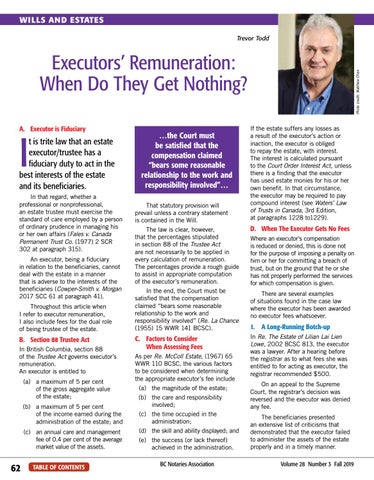WILLS AND ESTATES Trevor Todd
A. Executor is Fiduciary
I
t is trite law that an estate executor/trustee has a fiduciary duty to act in the best interests of the estate and its beneficiaries. In that regard, whether a professional or nonprofessional, an estate trustee must exercise the standard of care employed by a person of ordinary prudence in managing his or her own affairs (Fales v. Canada Permanent Trust Co. (1977) 2 SCR 302 at paragraph 315). An executor, being a fiduciary in relation to the beneficiaries, cannot deal with the estate in a manner that is adverse to the interests of the beneficiaries (Cowper-Smith v. Morgan 2017 SCC 61 at paragraph 41). Throughout this article when I refer to executor remuneration, I also include fees for the dual role of being trustee of the estate.
B. Section 88 Trustee Act In British Columbia, section 88 of the Trustee Act governs executor’s remuneration. An executor is entitled to (a) a maximum of 5 per cent of the gross aggregate value of the estate; (b) a maximum of 5 per cent of the income earned during the administration of the estate; and (c) an annual care and management fee of 0.4 per cent of the average market value of the assets.
62
TABLE OF CONTENTS
…the Court must be satisfied that the compensation claimed “bears some reasonable relationship to the work and responsibility involved”… That statutory provision will prevail unless a contrary statement is contained in the Will. The law is clear, however, that the percentages stipulated in section 88 of the Trustee Act are not necessarily to be applied in every calculation of remuneration. The percentages provide a rough guide to assist in appropriate computation of the executor’s remuneration. In the end, the Court must be satisfied that the compensation claimed “bears some reasonable relationship to the work and responsibility involved” (Re. La Chance (1955) 15 WWR 141 BCSC).
C. Factors to Consider When Assessing Fees As per Re. McColl Estate, (1967) 65 WWR 110 BCSC, the various factors to be considered when determining the appropriate executor’s fee include (a) the magnitude of the estate; (b) the care and responsibility involved; (c) the time occupied in the administration; (d) the skill and ability displayed; and (e) the success (or lack thereof) achieved in the administration. BC Notaries Association
Photo credit: Matthew Chen
Executors’ Remuneration: When Do They Get Nothing? If the estate suffers any losses as a result of the executor’s action or inaction, the executor is obliged to repay the estate, with interest. The interest is calculated pursuant to the Court Order Interest Act, unless there is a finding that the executor has used estate monies for his or her own benefit. In that circumstance, the executor may be required to pay compound interest (see Waters’ Law of Trusts in Canada, 3rd Edition, at paragraphs 1228 to1229).
D. When The Executor Gets No Fees Where an executor’s compensation is reduced or denied, this is done not for the purpose of imposing a penalty on him or her for committing a breach of trust, but on the ground that he or she has not properly performed the services for which compensation is given. There are several examples of situations found in the case law where the executor has been awarded no executor fees whatsoever.
1. A Long-Running Botch-up In Re. The Estate of Lilian Lai Lien Lowe, 2002 BCSC 813, the executor was a lawyer. After a hearing before the registrar as to what fees she was entitled to for acting as executor, the registrar recommended $500. On an appeal to the Supreme Court, the registrar’s decision was reversed and the executor was denied any fee. The beneficiaries presented an extensive list of criticisms that demonstrated that the executor failed to administer the assets of the estate properly and in a timely manner. Volume 28 Number 3 Fall 2019
